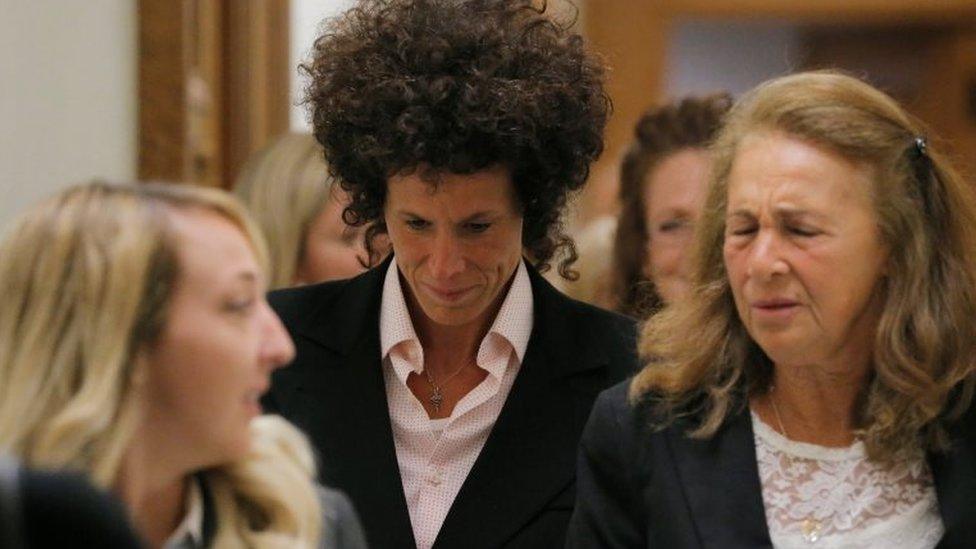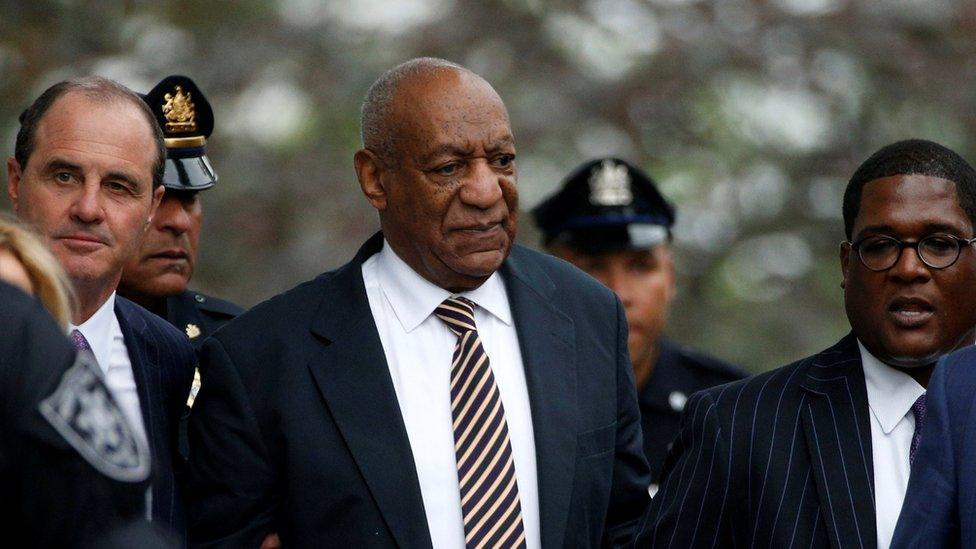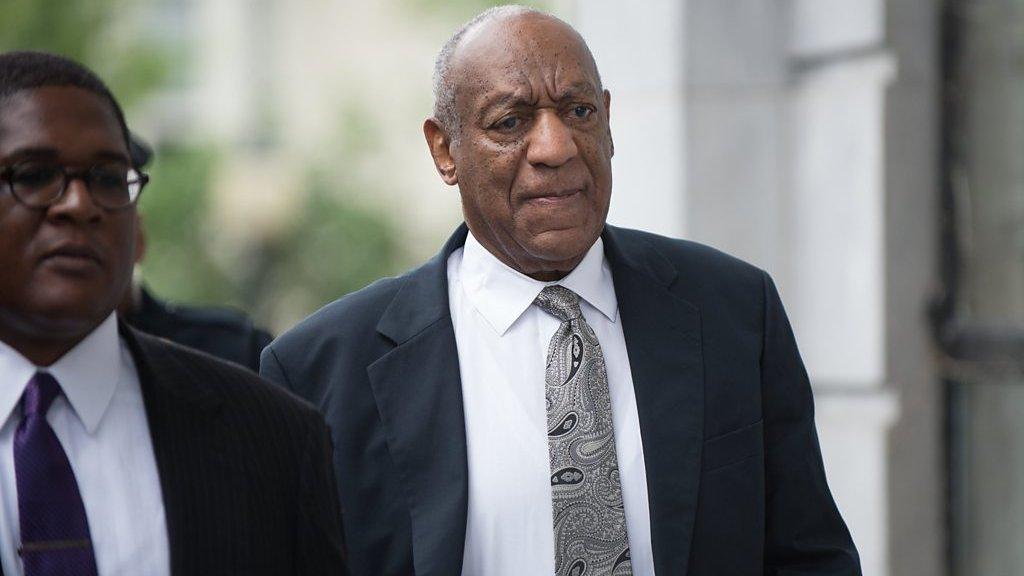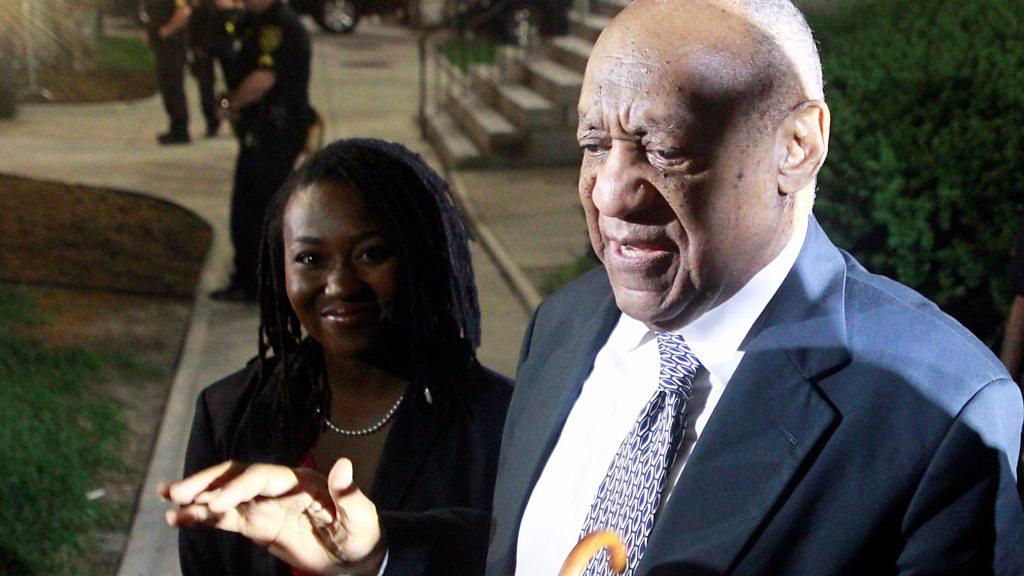Bill Cosby case: Judge declares mistrial after jury deadlock
- Published
A former guest star on the Bill Cosby show, Lili Bernard, called Cosby "a lying coward"
A US judge has declared a mistrial in the Bill Cosby sex assault case after the jury remained deadlocked for days.
The seven men and five women were unable to reach a unanimous decision after some 53 hours of deliberations in Norristown, Pennsylvania.
Mr Cosby, 79, is accused of drugging and sexually assaulting Andrea Constand in 2004. His lawyers had argued the sex was consensual.
The US comedian could now face new proceedings.
He walks away from court a free man, but the prosecution has already said it is pursuing a fresh trial.
Dozens of women say he assaulted them, but statute of limitation rules mean he was allowed to be tried for Ms Constand's allegation only.
The veteran entertainer could have faced up to a decade in prison if found guilty of three counts of aggravated indecent assault, which allegedly took place at his Philadelphia home 13 years ago.
Announcing the decision, Pennsylvania judge Steven O'Neill reminded Mr Cosby that he remains charged and on bail, despite the mistrial.
'Blinding power of celebrity'
One of Mr Cosby's lawyers, Brian McMonagle, applauded the decision, saying: "The judge is right - justice is real."
"We came here looking for an acquittal. But like that Rolling Stones song says, 'you don't always get what you want'. Sometimes you get what you need."
The district attorney who brought the charges, Kevin Steele, told reporters that the prosecution was seeking a retrial.
"We will evaluate and review our case. We will take a hard look at everything involved and then we will retry it. As I said in court, our plan is to move this case forward as soon as possible."
District Attorney Kevin Steele says he will review the case and ask for a retrial
A lawyer representing many of Mr Cosby's accusers, Gloria Allred, said she was hoping the prosecution would try the case again.
"We can never underestimate the blinding power of celebrity, but justice will come."

A blow for women's rights campaigners - Aleem Maqbool, BBC News, North America correspondent
As we had become accustomed to, Bill Cosby sat in court with his head bowed and his fist resting against his chin. He showed no emotion, first as the jury announced it could not come up with a unanimous verdict, and then as the judge declared a mistrial. After more than 50 hours of deliberating, it was what most had been expecting.
The only audible gasps in court came as prosecutors immediately said they would be seeking a retrial.
But emerging from the courthouse, it was clear which side considered this a victory.
Supporters chanted and cheered on the street as Bill Cosby came out smiling and waving, yet on the steps of the building some of the many women who had accused him of assault were left looking visibly upset and emotional.
One protester screamed in rage, saying this result had been another blow to women's rights in America.
His reputation has undoubtedly been tarnished. Many will have seen all those other women who couldn't bring their cases to trial - nearly 60 - with claims that there are many more who never spoke out because they don't want to disrupt their lives.
There's no question those stories have been read, and will have seeped into people's consciousness here in America.

In a strongly worded statement read by an aide, Bill Cosby's wife, Camille, took aim at the prosecutor, who she called "heinously and exploitatively ambitious", and the judge who she described as "overtly arrogant".
The jury had been instructed by the judge to work into the weekend to reach a verdict, after jurors first revealed that they were deadlocked on the case on Thursday.
But the panel returned again on Saturday to tell the judge they were still deadlocked on all three counts.

Andrea Constand (centre) was the only person to take Bill Cosby to trial over the sexual assault allegations due to the statute of limitations
Some of the many women who accused Mr Cosby of drugging and assaulting them over a 40-year time span were present in court last week awaiting the verdict.
Who said what:
The accuser, Andrea Constand, took the stand during the trial, telling the court the assault had left her feeling "humiliated" by someone she considered a friend and mentor.
At the time of the incident, she was the director of women's basketball at Temple University, where Mr Cosby was on the board of trustees.
Ahead of the jury's announcement, Mr Cosby thanked the jury for their "honest work"
Ms Constand, who was then 31, said he had offered her unidentified pills one night that left her unable to stop his advances.
In a 2005 deposition, Mr Cosby said he had given her the antihistamine Benedryl to relieve stress and went on to have consensual relations.
Prior to the court case, Ms Constand had been barred from sharing her story in public because of a confidential settlement reached with Mr Cosby in 2006.
When the deposition was unsealed by a federal judge two years ago, it was revealed he had previously admitted giving young women sedatives in the past.
Mr Cosby, who faces at least four separate civil lawsuits, did not testify at the trial.
The case is seen as the biggest US celebrity court case since the murder trial of former American footballer OJ Simpson in 1995.
- Published5 June 2017

- Published17 June 2017

- Published17 June 2017
